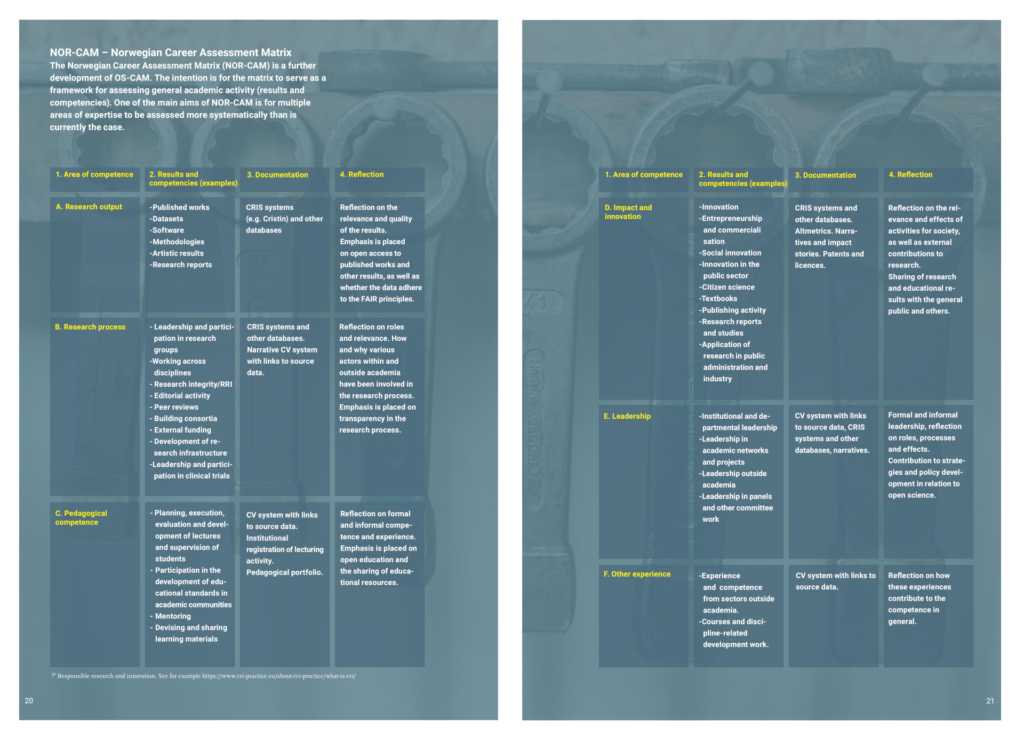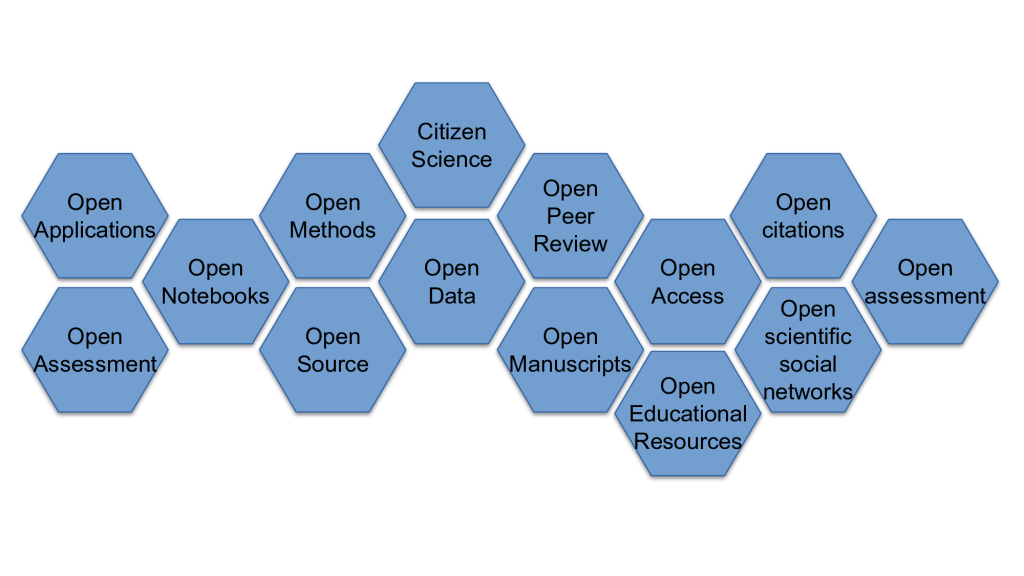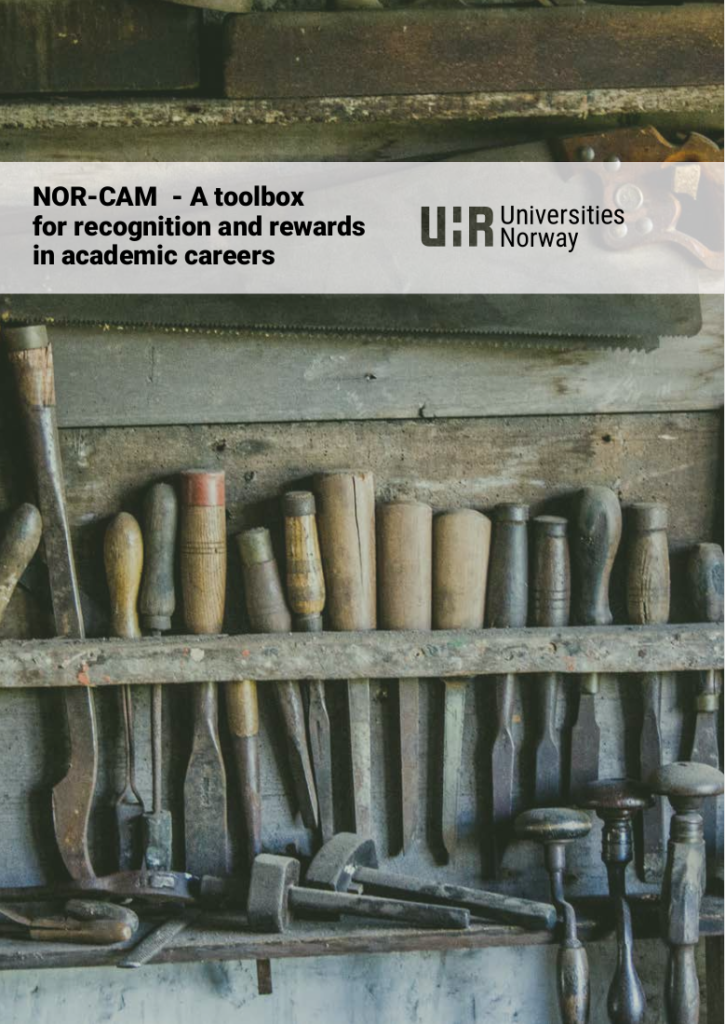What is the future of academic career assessment? How can open research practices be included as part of a research evaluation? These were some of the questions we asked ourselves in a working group set up by Universities Norway. Almost two years later, the report is ready. Here I will share some of the ideas behind the suggested Norwegian Career Assessment Matrix (NOR-CAM) and some of the other recommendations coming out of the workgroup.

EUA work on research assessment
I have for some years been Norway’s representative in the European University Association’s Expert Group on Open Science/Science 2.0 (on a side note, I have written elsewhere about why I think it should be called Open Research instead). The expert group meets 3-4 times a year, usually in Brussels but nowadays online, to discuss how Open Science principles can be developed and implemented in European universities.
A lot of things have happened in the world of Open Science during the three years that I have been in the expert group. Open access to publications is improving every day. Open access to research data is coming along nicely, although there are still many challenges. Despite the positive developments, there is one key challenge that we always get back to discussing: research assessment. How should researchers get their “points” in the system, who should get the job, and who should get a promotion?
Up until now, publication lists and citation counts have been the most important “currency” for researchers. We have, over the years, seen an unfortunate focus on metrics, like the h-index and the journal impact factor (and others). The challenge is that only asking for publication lists (and publication-related metrics) takes focus away from all the other elements of an open research ecosystem.

The need to rethink research assessment led to the EUA Webinar on Academic Career Assessment in the Transition to Open Science last year. As the title of the webinar shows, we decided to broaden the perspective from only thinking about research assessment to considering academic career assessment more generally. This also became the focus of the Universities Norway workgroup and the final report.
Six principles
In the report we list six principles for the future of career assessment:
- Measure quality and excellence through a better balance between quantitative and qualitative goals
- Recognise several competencies as merits but not in all areas at the same time or by each employee
- Assess all results, activities and competencies in the light of Open Science principles
- Practice transparency in the assessment and visibility of what should be recognised as merit
- Promote gender balance and diversity
- Assist in the concrete practice of job vacancy announcements and assessment processes locally
Four recommendations
The work group then went on to suggest four recommendations for different actors (individuals, institutions, research funders, government):
- To establish a comprehensive framework for the assessment of academic careers that:
- balances quantitative and qualitative goals and forms of documentation for academic standards and competencies
- enables diverse career paths and promotes high standards in the three key areas: education, research and interaction with society
- recognises the independent and individual competencies of academic staff as well as their achievements in groups and through collaboration
- values ??Open Science principles (including open assessment systems)
- values and encourages academic leadership and management
- To engage internationally in developing a Norwegian assessment model because:
- changes in the assessment criteria cannot be made by one country alone
- a Norwegian model can contribute to related processes internationally
- To use NOR-CAM as a practical and flexible tool for assessing academic results, competence and experience for academic personnel. NOR-CAM will highlight six areas of expertise through systematic documentation and reflection
- To develop an ‘automagic CV system’ that enables academics to retrieve data that can be used to document competencies and results in their own career, including applications for positions, promotions and external funding.
Follow-up
Today, I presented the Norwegian report for the EUA workgroup. In many ways, the circle is completed. After all, the inspiration for the Norwegian report came directly from the work of EUA. Hopefully, the report can inspire others in Europe (and beyond) to think anew about career assessment.
Even though it took nearly two years, writing a report is only the beginning. Now it is time to work on how NOR-CAM can be implemented. I am looking forward to contributing to making it become a reality.
Read the full report here:
